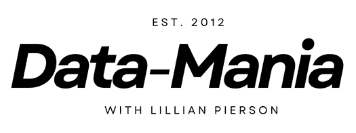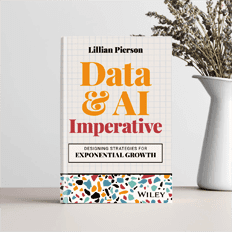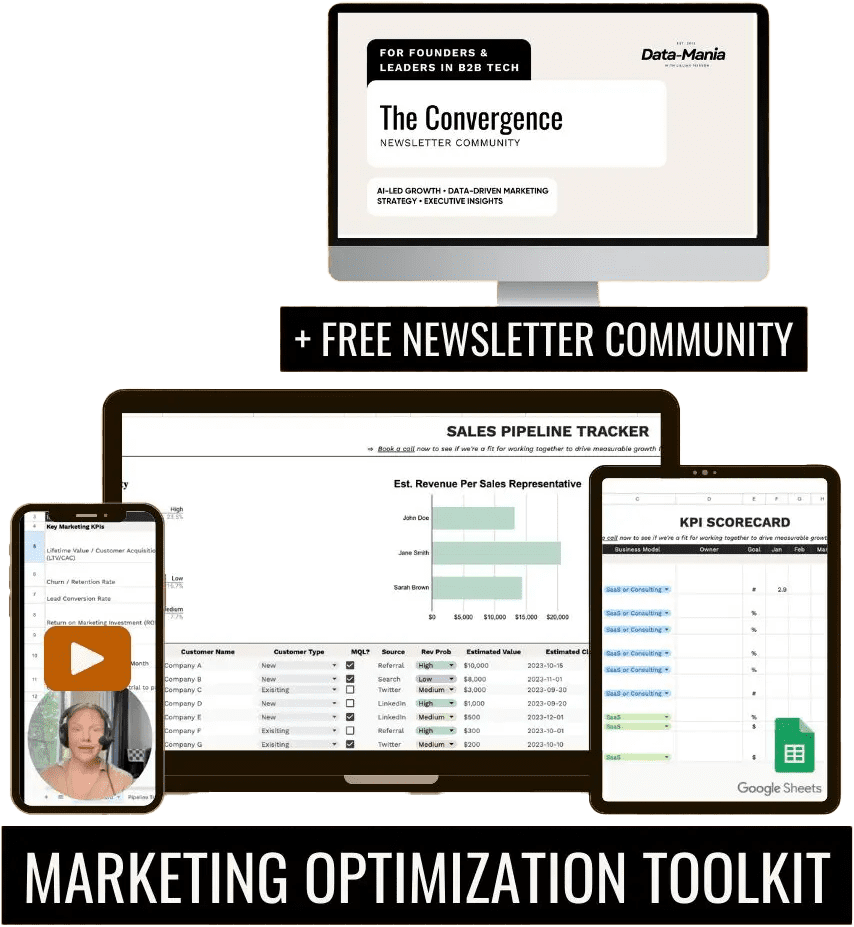Startups in 2025 need smart, AI-driven marketing tools to grow efficiently. This list highlights the top 10 tools every tech startup should consider to boost productivity, streamline workflows, and scale operations effectively:
- Jasper: AI-powered content creation with SEO and brand voice integration.
- SEMrush: Comprehensive SEO and competitor analysis for better online visibility.
- HubSpot: CRM-driven automation for lead nurturing and customer engagement.
- Klaviyo: Predictive analytics for highly targeted email marketing campaigns.
- Google Analytics 4: Advanced, privacy-compliant web analytics with AI insights.
- Tableau: Data visualization for actionable insights and real-time tracking.
- Hootsuite: Social media management with AI content scheduling.
- Buffer: Simplified social media automation for lean teams.
- Leadfeeder: Identifies anonymous website visitors to generate B2B leads.
- Drift: AI chatbots for real-time lead qualification and conversational marketing.
Quick Comparison
| Tool | Core Features | Best For | Starting Price |
|---|---|---|---|
| Jasper | AI content creation, SEO integration | Content creation | $39/seat/month |
| SEMrush | SEO audit, competitor tracking | SEO & market research | $119.95/month |
| HubSpot | CRM, marketing automation | CRM & lead management | Free (basic) |
| Klaviyo | Predictive segmentation, analytics | Email marketing | $45/month |
| Google Analytics | AI insights, privacy compliance | Web analytics | Free |
| Tableau | Data visualization, live dashboards | Data-driven decisions | $70/user/month |
| Hootsuite | Social media scheduling, analytics | Social media management | $99/month |
| Buffer | AI scheduling, performance tracking | Social media automation | $6/channel/month |
| Leadfeeder | Lead scoring, behavior tracking | B2B lead generation | $63/month |
| Drift | AI chatbots, lead qualification | Conversational marketing | $50/user/month |
These tools are designed to integrate seamlessly, scale with your business, and deliver measurable results for startups navigating the competitive 2025 landscape.
13 Best AI Tools For Startups & Entrepreneurs
1. Jasper
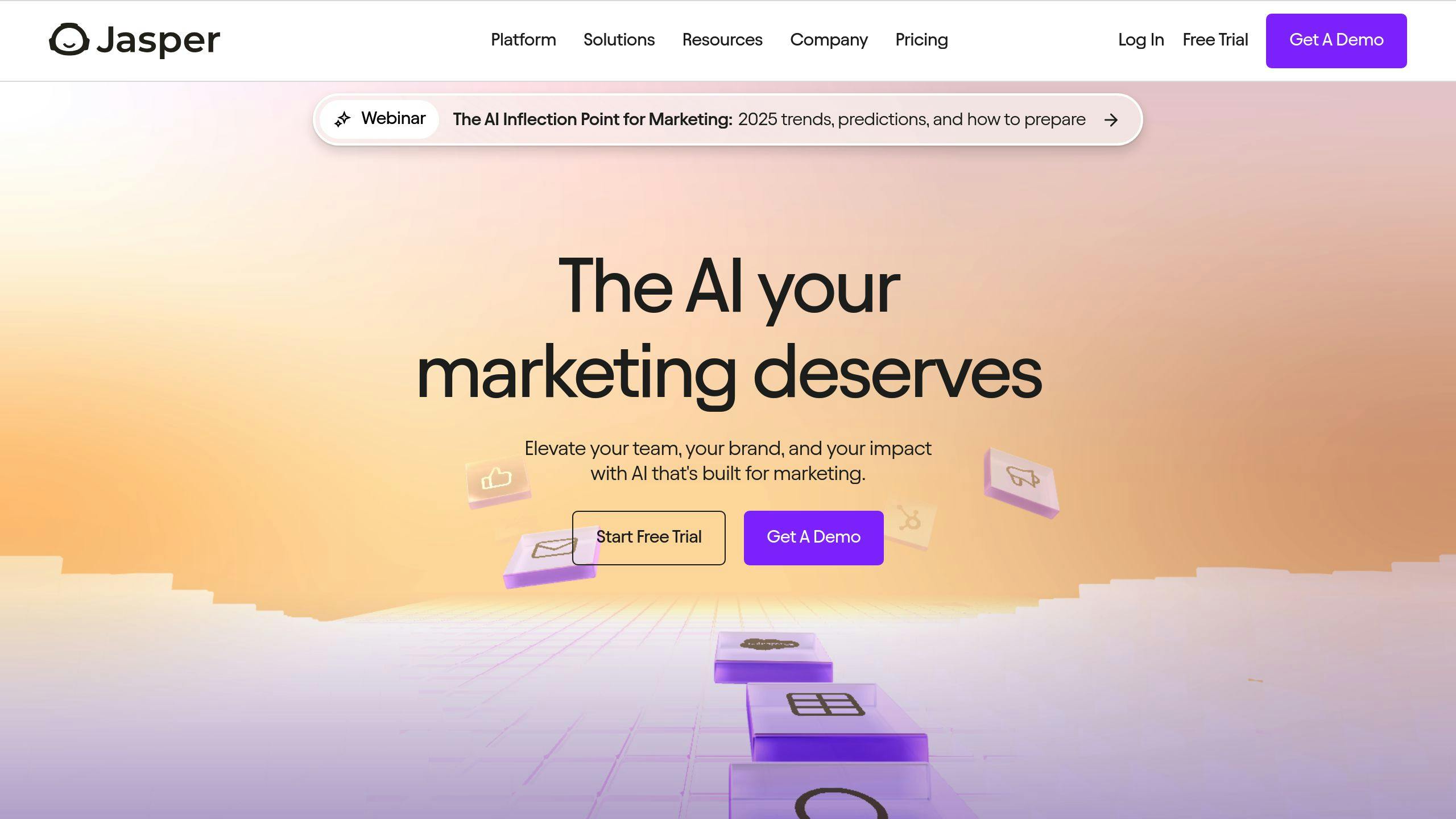
Jasper’s AI document editor helps create SEO-friendly content while ensuring consistent brand messaging by learning and adapting to your brand’s tone. This tool is designed for marketing teams aiming to scale their content production quickly and effectively.
"Marketers can now leverage Jasper as a coworker… With the ability to generate campaigns, optimize content, and collaborate in real-time, teams can harness the power of AI where they already work – keeping workflows seamless and on-brand." [1]
Jasper stands out for tech startups thanks to its range of features:
| Feature | How It Helps Startups |
|---|---|
| AI Document Editor | Simplifies content creation with integrated SEO practices |
| Brand Voice Integration | Ensures consistent messaging across platforms |
| AI Image Suite | Produces custom visuals in seconds |
| No-code App Builder | Empowers teams to build tools without coding skills |
Jasper integrates with HubSpot, SEMrush, and Hootsuite, addressing scalability needs by connecting with key marketing tools. Through Slack, it enhances team collaboration and keeps workflows smooth.
The AI Image Suite is especially useful for small teams that need high-quality visuals for multiple platforms but lack the resources for dedicated design work.
For startups aiming to grow their marketing efforts, Jasper’s no-code App Builder eliminates technical hurdles, enabling teams to create custom applications and workflows without needing developers. Its SEO-focused approach pairs seamlessly with SEMrush’s keyword tools, which we’ll cover next.
2. SEMrush

Jasper simplifies content creation, but SEMrush lays the groundwork for how and where that content should be distributed. It combines AI-driven insights with SEO tools to help tech startups build their online presence using actionable data and automated processes.
Here’s how SEMrush supports startups:
| Feature Category | Benefits for Startups |
|---|---|
| SEO Suite | Boosts organic visibility and website traffic |
| Competitive Analysis | Helps make informed, data-backed decisions |
| Content Optimization | Simplifies and speeds up the content workflow |
SEMrush stands out by offering flexible pricing and customizable tools, making it adaptable for startups of various sizes. Its multi-user access feature is especially useful for marketing teams, enabling better collaboration.
When it comes to integration, SEMrush connects seamlessly with key marketing platforms. This creates a unified dashboard where startups can monitor and fine-tune their marketing efforts all in one place.
"SEMrush’s integrated platform provides a broader range of functionalities, making it a valuable investment for startups looking for an all-in-one marketing solution" [3]
The platform also uses AI to perform technical SEO audits, automatically flagging and prioritizing website issues. Plus, its content suggestions help startups maintain a steady publishing schedule without the need for time-consuming manual research.
This data-driven approach pairs well with HubSpot’s CRM-focused marketing automation, creating a powerful combination for startups aiming to grow effectively.
3. HubSpot
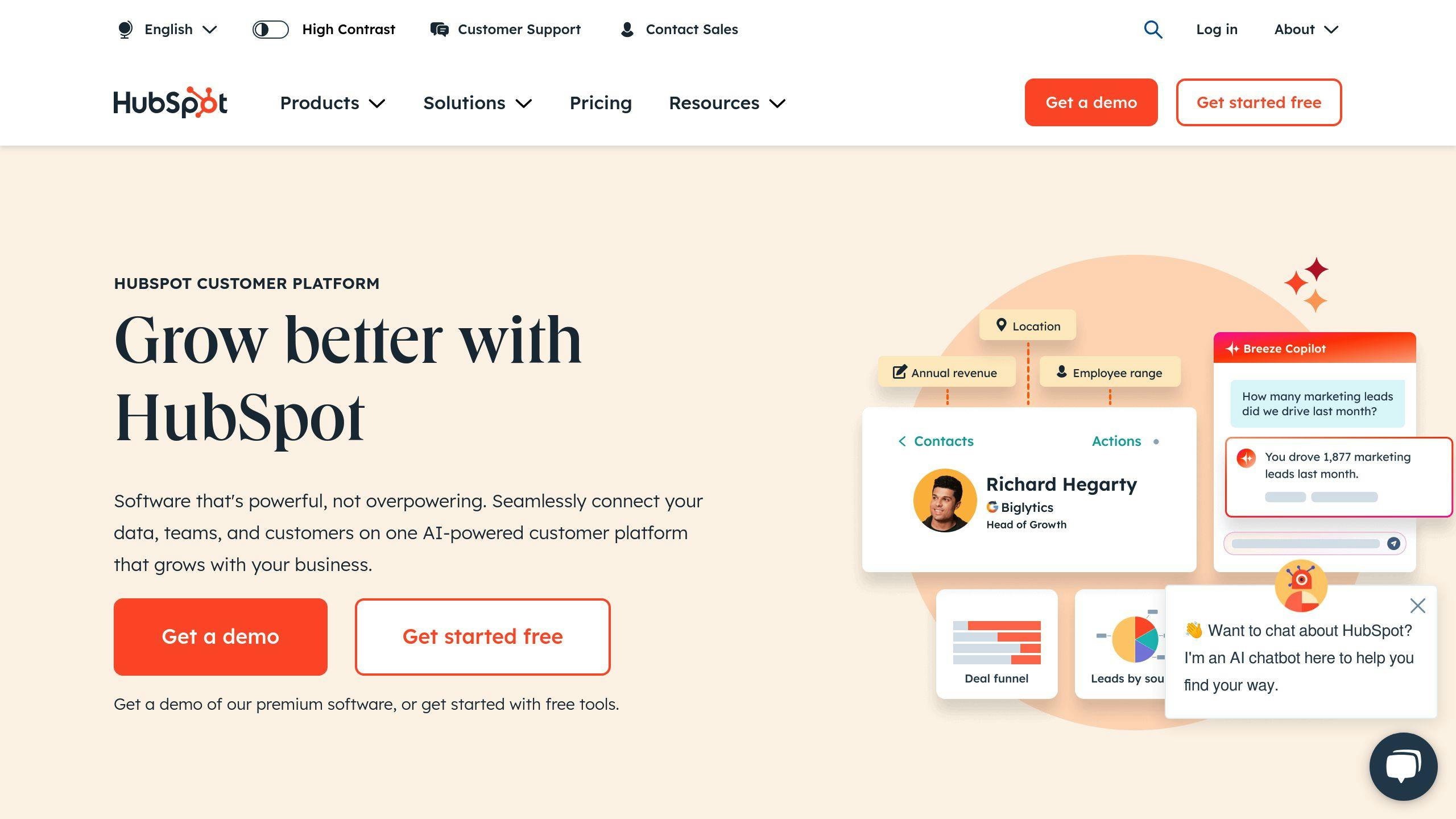
SEMrush might help you drive traffic, but HubSpot takes it a step further by turning that traffic into leads and customers using its CRM-driven automation tools. With AI at its core, HubSpot simplifies the entire lead-to-customer process.
The HubSpot 2025 platform is packed with smart automation tools. Its AI engine segments audiences automatically based on behavior, making targeted campaigns easy to set up.
| Feature | How It Helps Tech Startups |
|---|---|
| Smart Content Creation | Offers AI-based content ideas and optimization tips |
| Predictive Lead Scoring | Automatically spots high-value prospects |
| Multi-channel Automation | Coordinates marketing across email, social, and web |
| API Hub | Integrates with over 1,000 tools for added flexibility |
The platform grows with you. Its modular setup means you can activate features as your startup scales.
For tech startups chasing fast growth, HubSpot excels at scaling personalized customer engagement. It tracks behavior across multiple channels and delivers tailored content automatically.
On average, HubSpot users see a 55% increase in website traffic thanks to its automated lead-nurturing workflows [1]. This CRM-first approach lays the groundwork for Klaviyo’s advanced email targeting, which we’ll dive into next.
4. Klaviyo

Klaviyo takes CRM data and turns it into revenue through highly targeted campaigns. With its predictive analytics, the platform automatically segments audiences based on behavior and purchase history, sending perfectly timed messages without requiring manual effort.
| Feature | Benefit for Tech Startups |
|---|---|
| AI-Powered Segmentation | Pinpoints high-value prospects automatically |
| Behavioral Tracking | Builds real-time, dynamic customer profiles |
| Multi-Channel Integration | Connects with e-commerce and CRM platforms |
| Predictive Revenue Analytics | Helps startups focus on efficient growth strategies |
For startups aiming to show strong marketing ROI early on, Klaviyo delivers impressive results: an average return of $38 for every dollar spent. This makes it a budget-friendly option for companies looking to grow.
What makes Klaviyo stand out in 2025 is its ability to integrate deeply with major e-commerce platforms and CRM systems. This creates a unified view of customer interactions and, when paired with HubSpot’s CRM, forms a closed-loop system for better insights and actions.
"Klaviyo’s automation features have been a game-changer for our business. We’ve seen a significant increase in revenue from our email campaigns." – Emily Ley, Founder of Emily Ley Designs
For tech startups on a growth path, Klaviyo’s cloud infrastructure scales effortlessly as your user base grows. Brooklinen, for example, experienced a 25% revenue boost using Klaviyo’s automation tools.
The platform continuously fine-tunes customer segments and boosts campaign performance, making it a smart choice for targeting technical audiences with precision.
5. Google Analytics 4
Google Analytics 4 (GA4) provides startups with enterprise-level insights at a cost that works for smaller budgets. It combines AI-driven forecasts with cross-platform tracking to give businesses a clearer picture of their audience and performance.
| Feature | Benefit for Startups |
|---|---|
| AI-Powered Predictions | Estimates purchase likelihood and churn risk |
| Cross-Platform Tracking | Tracks user activity across web and mobile |
| BigQuery Integration | Free data exports for in-depth analysis |
| Enhanced Privacy | Tracks without relying on third-party cookies |
GA4 uses machine learning to identify customer trends automatically. Its real-time dashboards allow startups to make quick, informed decisions. The integration with Google Ads is a game-changer, as it removes users who have already converted from ad audiences, saving money on unnecessary ad spend.
The platform also offers unified reporting, which tracks user journeys across devices and channels. This helps startups understand how their audience interacts with their product, from discovery to conversion and beyond.
For startups focused on efficiency, GA4 ensures compliance with cookie-less tracking and allows advanced data analysis through BigQuery without additional costs. Its AI helps maintain accurate reporting even with stricter privacy measures, so you can trust the data without compromising user privacy.
Next, we’ll explore how Tableau takes this data to the next level with advanced visualization tools.
sbb-itb-e8c8399
6. Tableau

While GA4 offers core analytics, Tableau takes things further by turning raw data into visual stories that drive strategic decisions. With AI-powered tools similar to GA4’s predictive analytics, Tableau helps startups go beyond reporting by identifying trends and anticipating market shifts.
One standout feature is Ask Data, which allows marketers to query metrics using plain language – no SQL knowledge required. This aligns perfectly with the growing focus on AI-driven marketing, enabling teams to prioritize strategy over technical skills.
| Feature | Marketing Benefit |
|---|---|
| Data Stories | Automatically generates narratives based on marketing data |
| Cross-Platform Integration | Connects seamlessly with GA4, Salesforce, and HubSpot for unified reports |
| Cloud Scalability | Handles growth without sacrificing performance |
| Real-time Visualization | Builds interactive dashboards for live campaign tracking |
Tableau’s pricing is flexible, starting at $35/user for Creators and $5/user for Viewers, making it accessible for startups at various growth stages.
"Tableau has been instrumental in helping us make data-driven decisions across our organization." – Michael Pearce, Redfin [3]
The platform also integrates with major tools, merging data streams into cohesive dashboards. Its Explain Data feature highlights trends and anomalies automatically, allowing marketers to address potential issues or seize opportunities before they affect performance.
This visual-first approach pairs well with tools like Hootsuite for monitoring social media activity – something we’ll dive into next.
7. Hootsuite
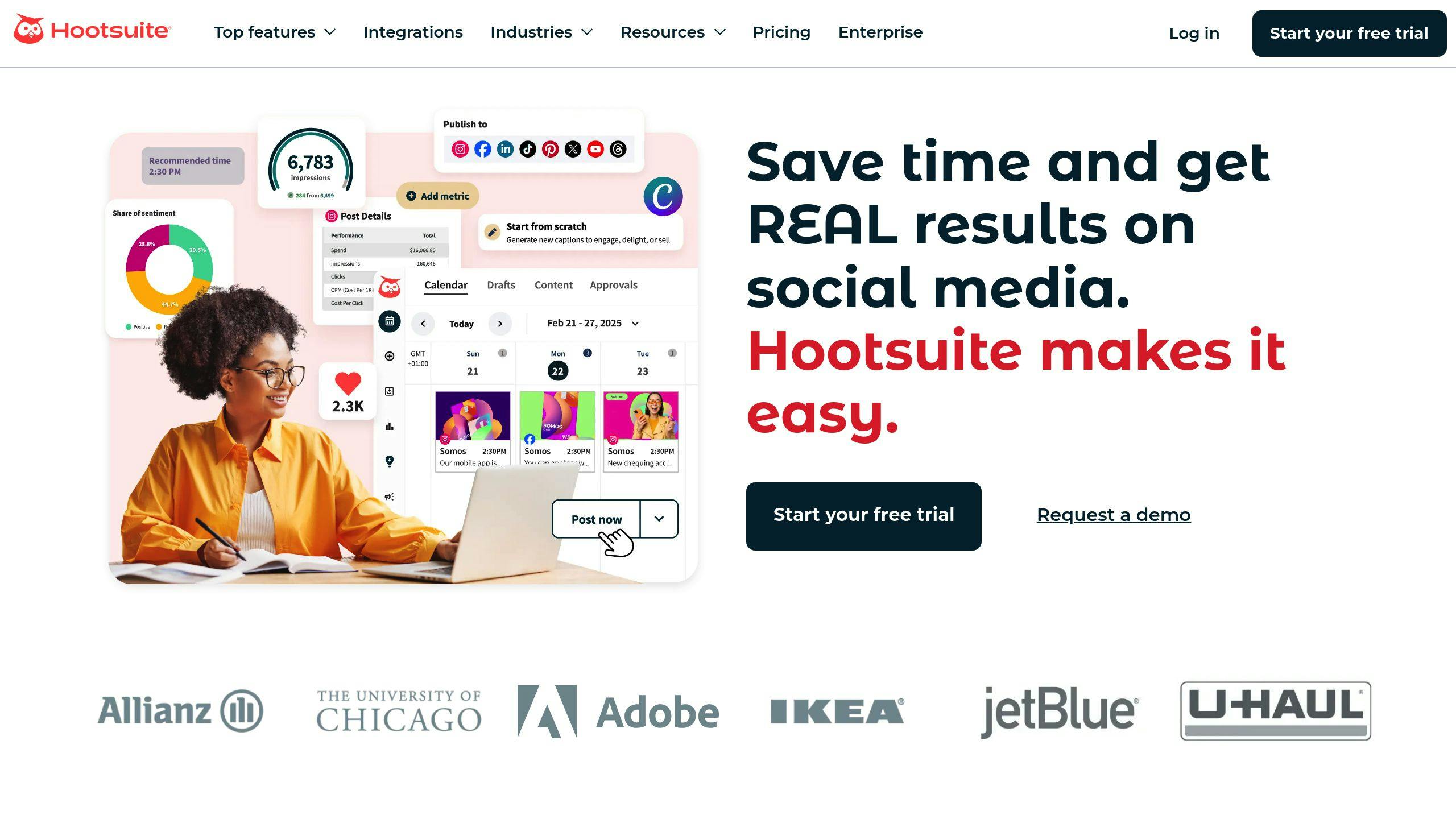
Hootsuite goes beyond data visualization by turning insights into action on social media. This platform helps tech startups manage their social presence with ease, using AI to streamline content creation and execution.
Hootsuite’s AI content assistant creates posts tailored for each platform while keeping your brand’s tone consistent. It automates tasks like scheduling and tracking performance, making it a great fit for startups looking to scale efficiently without overspending.
| Feature | How It Helps Tech Startups |
|---|---|
| AI Content Tools | Creates content ideas and tracks campaign effectiveness |
| Team Collaboration | Simplifies approval processes and content planning |
Pricing starts at $19/month for basic plans and scales up to enterprise solutions [3]. Like Jasper and HubSpot, Hootsuite offers strong API connections, aligning with the need for seamless integrations highlighted earlier.
"Hootsuite has revolutionized how we approach social media management. The platform’s analytics and automation features have helped us achieve a 28% increase in engagement while significantly reducing our team’s manual workload." – From Gartner Peer Insights, rated 4.5/5 based on 2,000+ reviews [2]
Hootsuite’s API-driven design creates a unified data ecosystem, providing detailed marketing insights. It also supports multi-brand accounts, allowing startups to grow without needing extra user licenses.
This emphasis on actionable social engagement naturally leads into Buffer’s approach to simplifying content scheduling.
8. Buffer
Buffer is a great choice for startups looking for a simple way to manage their social media. It’s designed with lean teams in mind, offering an easy-to-use platform and automation tools that help save time and effort.
With AI-powered features, Buffer creates platform-specific posts and automates scheduling, freeing up about 5 hours of work each week. Its API-first design ensures smooth integration with other marketing tools, keeping your data connected and workflows efficient.
| Feature | How It Helps Startups |
|---|---|
| AI Content Suggestions | Cuts down content creation time by 40% |
| Cross-Platform Analytics | Provides a single view of all social performance |
| Custom Publishing Schedule | Schedules posts for peak engagement times |
Buffer also integrates with GA4, feeding social media data into broader analytics. This complements tools like Tableau for visual insights and Leadfeeder for tracking leads.
"Buffer’s automation features helped us scale our social media presence while maintaining our lean team structure. We’ve seen a 45% increase in engagement across all platforms since implementing Buffer’s AI-powered scheduling system."
Pricing starts at $15/month per channel, and there’s a free tier to try out the basics. Its analytics tools give you a clear picture of engagement and audience demographics, helping startups fine-tune their social media strategies based on real data.
9. Leadfeeder

Leadfeeder turns anonymous website visitors into sales opportunities by using AI to identify and track visitor behavior. It works well alongside Buffer’s social engagement data, linking website activity to potential conversions.
With AI-powered lead scoring, Leadfeeder highlights the most promising prospects, cutting down on manual prospecting tasks. It integrates smoothly with other tools, offering a streamlined way to qualify and track leads.
| Feature | Benefit for Lead Generation |
|---|---|
| AI Lead Scoring | Speeds up lead qualification by 30% |
| Company Identification | Identifies 85% of anonymous website visitors |
| Behavior Tracking | Maps out conversion paths across multiple sessions |
| CRM Integration | Syncs lead data automatically with over 40 platforms |
The platform’s secure infrastructure ensures compliance, which is especially useful for startups with strict data requirements. Real-time visitor alerts allow sales teams to act quickly, making it ideal for startups aiming to respond to high-intent prospects without delay.
"Implementing Leadfeeder resulted in a 50% increase in our sales-qualified leads while reducing our sales cycle by nearly a third. The AI-powered lead scoring has been a game-changer for our sales team’s efficiency", shares a customer review on G2 [4].
One standout feature of Leadfeeder is its ability to spot high-intent visitors based on their actions. It automatically filters out irrelevant traffic, like bots or competitors, so startups can focus on genuine potential customers. Its seamless integration with tools like Buffer and Drift helps unify lead generation and engagement processes.
10. Drift

Drift focuses on turning prospects into customers through real-time conversations. Its AI-powered chatbots handle lead qualification, making it a great choice for startups with limited resources.
Drift’s 2023 data highlights some impressive results: businesses using their conversational marketing tools see a 20% boost in qualified leads and a 15% drop in customer acquisition costs.
| Feature | Benefit for Tech Startups |
|---|---|
| AI Chatbots | Cuts response time by 70% |
| Lead Qualification | Boosts qualified leads by 20% |
| Custom Workflows | Enhances team efficiency by 25% |
| Multi-Channel Integration | Centralizes communication across platforms |
Drift starts at $50 per user per month and integrates seamlessly with tools like HubSpot and Salesforce, ensuring your tech stack stays connected.
"Conversational marketing is about having a human-like conversation with your customers, at scale", says David Cancel, CEO of Drift [5].
One of Drift’s key strengths is its ability to tailor customer interactions using AI-driven insights. By analyzing visitor behavior, the platform adjusts conversations in real time, making engagements more relevant and impactful.
Drift’s analytics features also pair well with Tableau’s visualization tools. It tracks metrics like engagement rates and conversion paths, helping teams fine-tune campaigns and clearly measure ROI.
Comparison Table
Choosing the right tools can be overwhelming for tech startups, but a side-by-side comparison of features, pricing, and use cases can make the process easier. Here’s a look at some of the top marketing tools for 2025:
| Tool | Core Features | Best For | Starting Price | Key Advantage |
|---|---|---|---|---|
| Jasper | No-code app builder, AI Image Suite | Content Creation & Design | $39/seat/month | Maintains brand consistency with AI-powered content |
| SEMrush | Technical SEO audit, Competitor tracking | SEO & Market Research | $119.95/month | Offers detailed competitor insights and SEO strategies |
| HubSpot | CRM, Marketing IQ, Automation | CRM & Marketing Automation | Free (basic) | Combines marketing and sales into one platform |
| Klaviyo | Predictive segmentation, Behavior tracking | E-commerce Marketing | $45/month | Tracks and analyzes customer behavior effectively |
| Google Analytics 4 | AI predictions, Cross-device tracking | Web Analytics | Free | Provides cookie-free tracking with machine learning insights |
| Tableau | Interactive dashboards, AI insights | Data Visualization | $70/user/month | Enables real-time visual data analysis |
| Hootsuite | Multi-platform management, AI scheduling | Social Media Management | $99/month | Optimizes posts across multiple platforms automatically |
| Buffer | Smart scheduling, Performance analytics | Social Media Automation | $6/channel/month | Streamlines social media tasks |
| Leadfeeder | Company identification, Behavior mapping | B2B Lead Generation | $63/month | Identifies anonymous website visitors |
| Drift | AI chatbots for lead qualification | Conversational Marketing | $50/user/month | Automates lead qualification and routing with AI chatbots |
Many of these tools integrate with CRM systems, analytics platforms, and social media tools, creating a connected ecosystem for marketing. The right choice depends on your startup’s specific goals and growth plans. While some tools might seem pricey upfront, their potential to deliver a strong return on investment often makes them worthwhile for growing businesses.
When evaluating options, think about where your startup is now and where it’s headed. Tools that emphasize integration and scalability can help you build a tech stack that evolves with your business. This table provides a snapshot of what these tools offer, helping you take the next step in finding the perfect fit for your needs.
Conclusion
The marketing tools available in 2025 present tech startups with incredible opportunities to grow and operate more efficiently. With 61% of marketers now viewing AI as a critical part of their strategies [2], these tools have shifted from being optional to playing a central role in success.
What’s changing? Marketing technology has evolved. Advanced data analysis, once exclusive to large enterprises, is now within reach for startups, helping them compete more effectively in the digital world.
Here are three key trends shaping the future of marketing for startups:
- AI-Powered Automation: Tools are becoming smarter, offering advanced personalization and predictive insights across marketing efforts.
- Focus on Data Privacy: With the move toward cookie-free tracking, startups will need analytics tools that prioritize compliance with privacy regulations.
- Cross-Platform Integration: Tools are connecting more seamlessly, creating unified ecosystems that simplify workflows.
These trends highlight the need for startups to choose tools that not only solve today’s challenges but also prepare them for the future. The right marketing stack isn’t just about functionality – it’s about aligning with your goals and ensuring smooth integration.
For startups aiming to make an impact in 2025, the focus should be on tools that are scalable and capable of meeting evolving customer expectations. Building a marketing infrastructure that’s both flexible and growth-ready will be key to thriving in a fast-changing market.
Related Blog Posts
- Marketing Tech Stack Checklist for Early-Stage Startups
- When Should Startups Hire a Fractional CMO?
- How to Build a SaaS Marketing Strategy from Scratch
- 5 Ways AI Can Optimize Marketing ROI for your Tech Startup
